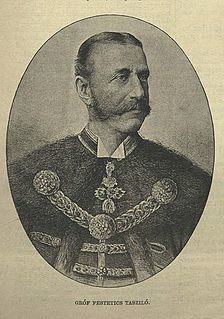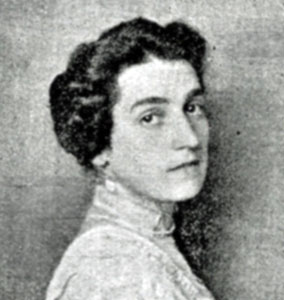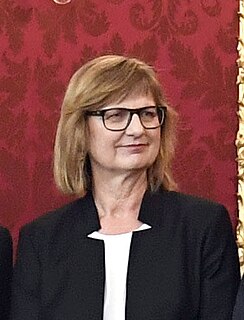
The Federal Chancellor of Austria is the head of government of the Republic of Austria. The position corresponds to that of Prime Minister in several other parliamentary democracies. The term is gendered in the German language.

Dame Olga Maria Elisabeth Friederike Schwarzkopf, was a German-born Austro-British soprano. She was among the foremost singers of lieder, and was renowned for her performances of Viennese operetta, as well as the operas of Mozart, Wagner and Richard Strauss. After retiring from the stage, she was a voice teacher internationally. She is considered one of the greatest sopranos of the 20th century.

Princess Ileana of Romania, also known as Mother Alexandra, was the youngest daughter of King Ferdinand I of Romania and his consort, Queen Marie of Romania. She was a great-granddaughter of Queen Victoria, Tsar Alexander II and Queen Maria II of Portugal. She was born as Her Royal Highness Ileana, Princess of Romania, Princess of Hohenzollern-Sigmaringen.

Bad Ischl[baːt ˈɪʃl̩] is a spa town in Austria. It lies in the southern part of Upper Austria, at the Traun River in the centre of the Salzkammergut region. The town consists of the Katastralgemeinden Ahorn, Bad Ischl, Haiden, Jainzen, Kaltenbach, Lauffen, Lindau, Pfandl, Perneck, Reiterndorf and Rettenbach. It is connected to the village of Strobl by the river Ischl, which drains from the Wolfgangsee, and to the Traunsee, into which the stream empties. It is home to the Kaiservilla, summer residence of Austro-Hungarian monarchs Emperor Franz Joseph I and Empress Elisabeth. In 2024, Bad Ischl will be the European Capital of Culture – the third city in Austria after Graz (2003) and Linz (2009).

Elisabeth Gehrer is an Austrian politician for the Austrian People's Party (ÖVP). From May 1995 until January 2007, Gehrer was Federal Minister of Education, Science and Culture, at first in grand coalition governments headed by Franz Vranitzky and Viktor Klima, and from 2000 onwards in Wolfgang Schüssel's coalition government. From 1999 to 2007, she also served as vice party chairperson of the Austrian People's Party (ÖVP).

Elisabeth is a Viennese, German-language musical commissioned by the Vereinigte Bühnen Wien (VBW), with book/lyrics by Michael Kunze and music by Sylvester Levay. It portrays the life and death of Empress Elisabeth of Austria, wife of Emperor Franz Joseph I. It has been translated into seven languages and seen by over ten million spectators worldwide, making it the most successful German-language musical of all time. It has not yet been staged in the English speaking world.

Prince Tasziló Festetics de Tolna was a member of the Hungarian noble family of Festetics.

Princess Marie-Adélaïde of Luxembourg was a Luxembourgish princess, the third child and the second daughter of Grand Duchess Charlotte (1896–1985) and Prince Felix of Bourbon-Parma (1893–1970).

Maximilian, Duke von Hohenberg, was the elder son of Archduke Franz Ferdinand of Austria-Hungary and his wife Countess Sophie Chotek von Chotkowa und Wognin, Duchess von Hohenberg. Because his parents' marriage was morganatic, he was excluded from succession to the Austro-Hungarian throne, to which his father was heir presumptive, and to inheritance of any of his father's dynastic titles, income, and properties, although not from the archduke's personal estate nor from his mother's property.

Ernestine von Fürth, née Kisch was an Austrian-Jewish women's activist, a founding member of the "Neuen Wiener Frauenklub", chairwoman of the Austrian women's suffrage committee, and editor for the "Zeitschrift für Frauenstimmrecht" in Austria.

Brigitte Bierlein is an Austrian former jurist who served as Chancellor of Austria from June 2019 to January 2020. An Independent, she was the first female Chancellor of Austria.

Gernot Blümel is an Austrian politician of the Austrian People's Party (ÖVP). He is Austria's finance minister since 2020. Since 2015, he has been the chairman of the Vienna branch of the ÖVP. Prior, he was Chancellery minister for European Affairs, Art, Culture, and Media from 2017 to 2019; he was also General Secretary of the ÖVP from 2013 to 2015.

The Bierlein government was the 32nd Government of Austria following the collapse of the First Kurz government headed by Chancellor Sebastian Kurz in the aftermath of the Ibiza affair. Sworn in on 3 June 2019, the Bierlein government was the first purely technocratic government in Austrian history, first interim government after a successful motion of no confidence in Parliament and first government headed by a female chancellor. As head of government, Brigitte Bierlein was assisted by Clemens Jabloner as vice-chancellor.

Maria Patek is an Austrian civil servant who served as the Minister for Sustainability and Tourism in the Bierlein government.

Iris Eliisa Rauskala is a Finnish-born Austrian civil servant and economist who served as Minister of Education, Science and Research in the Bierlein government.

Ines Stilling is an Austrian civil servant who served as the Minister for Women, Families and Youth in the Bierlein government.

Brigitte Zarfl is an Austrian civil servant. She served as Minister for Labour, Social Affairs, Health and Consumer Protection in the Bierlein government.
Elisabeth Sickl is an Austrian retired politician.

The Second Kurz government is the 33rd and current Government of Austria. Led by Sebastian Kurz as chancellor and Werner Kogler as vice-chancellor, it was sworn in by President Alexander Van der Bellen on 7 January 2020.



















